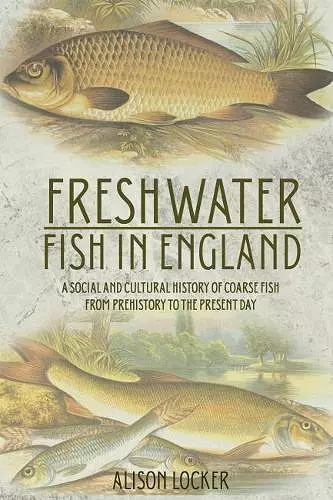Freshwater Fish in England
A Social and Cultural History of Coarse Fish from Prehistory to the Present Day
Format:Paperback
Publisher:Oxbow Books
Published:26th Oct '18
Currently unavailable, and unfortunately no date known when it will be back

Much has been written on marine fishing and for the migratory eel and salmon. Less attention has focused on the obligate freshwater species, primarily the native pike, perch, cyprinids and introduced species of which the most significant is carp. Their exploitation by man has changed from food to sport more dramatically in England and the British Isles than in Europe. They have also been used as elite statements, symbols of lineage, in religion and art. Much of the early evidence is confined to fish bones from archaeological sites and indicators of diet from isotopic analyses of human bones. From the Medieval period these data sources are increasingly complemented and ultimately superseded by documentary sources and material culture. The bones are relatively few from prehistoric contexts and mostly food waste. In the Mesolithic the bones are largely marine from middens on Scottish coasts, while early farmers apparently ate few fish of any type. Examples from European prehistoric sites demonstrate other cultural attitudes to fish. Both marine and freshwater fish bones are more numerous from Roman sites. There are regional and site type differences, but Roman influence appears to have increased fish consumption, though obligate freshwater species remain relatively few. The first evidence is seen for fishponds, probably ornamental. Angling was a noted sport elsewhere in the Empire, but there is no evidence in Britain. In Saxon England the exploitation and management of waterways and the beginnings of the privatization of the landscape, included enclosure of waters as fish stores. This previewed an elite practice of the Medieval period in which landscape features and documentary evidence demonstrate the importance of pond systems among a small section of elite medieval society and for whom these fish were an important part of feast and fast food and gift exchange. However quantitatively marine fish had dominated the fish supply from the late 10th century. The first documentary evidence for freshwater angling in England appears in the Medieval period, revealing an established sport through an oral tradition. The arrival of the common carp, in the 14th century, marks a change in pond culture, it soon became the favourite fish. By the early modern period freshwater fish are in slow decline on the table, though landscape water features evolve in style. The...
Alison Locker, a highly respected expert in fish remains archaeology, has assembled a valuable pioneering overview […] Freshwater fish deserves the attention of archaeologists, historians, and angling antiquaries alike. * Agricultural History Review *
ISBN: 9781789251128
Dimensions: unknown
Weight: unknown
172 pages